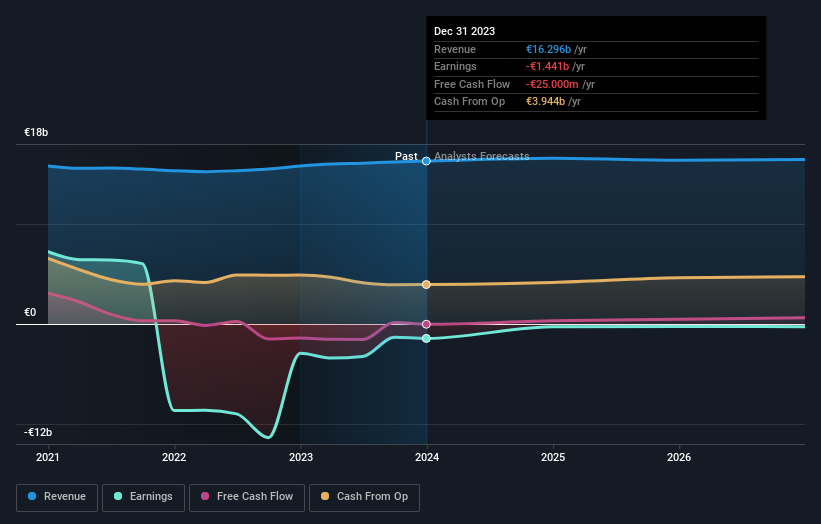Stock Analysis
- Italy
- /
- Telecom Services and Carriers
- /
- BIT:TIT
The past five years for Telecom Italia (BIT:TIT) investors has not been profitable

For many, the main point of investing is to generate higher returns than the overall market. But even the best stock picker will only win with some selections. At this point some shareholders may be questioning their investment in Telecom Italia S.p.A. (BIT:TIT), since the last five years saw the share price fall 52%. Shareholders have had an even rougher run lately, with the share price down 20% in the last 90 days.
So let's have a look and see if the longer term performance of the company has been in line with the underlying business' progress.
See our latest analysis for Telecom Italia
Given that Telecom Italia didn't make a profit in the last twelve months, we'll focus on revenue growth to form a quick view of its business development. Shareholders of unprofitable companies usually desire strong revenue growth. That's because fast revenue growth can be easily extrapolated to forecast profits, often of considerable size.
In the last five years Telecom Italia saw its revenue shrink by 3.7% per year. That's not what investors generally want to see. The share price decline of 9% compound, over five years, is understandable given the company is losing money, and revenue is moving in the wrong direction. The chance of imminent investor enthusiasm for this stock seems slimmer than Louise Brooks. Not that many investors like to invest in companies that are losing money and not growing revenue.
The company's revenue and earnings (over time) are depicted in the image below (click to see the exact numbers).

Take a more thorough look at Telecom Italia's financial health with this free report on its balance sheet.
What About The Total Shareholder Return (TSR)?
We'd be remiss not to mention the difference between Telecom Italia's total shareholder return (TSR) and its share price return. The TSR is a return calculation that accounts for the value of cash dividends (assuming that any dividend received was reinvested) and the calculated value of any discounted capital raisings and spin-offs. Its history of dividend payouts mean that Telecom Italia's TSR, which was a 49% drop over the last 5 years, was not as bad as the share price return.
A Different Perspective
While the broader market gained around 23% in the last year, Telecom Italia shareholders lost 16%. However, keep in mind that even the best stocks will sometimes underperform the market over a twelve month period. Regrettably, last year's performance caps off a bad run, with the shareholders facing a total loss of 8% per year over five years. We realise that Baron Rothschild has said investors should "buy when there is blood on the streets", but we caution that investors should first be sure they are buying a high quality business. It's always interesting to track share price performance over the longer term. But to understand Telecom Italia better, we need to consider many other factors. Like risks, for instance. Every company has them, and we've spotted 2 warning signs for Telecom Italia (of which 1 makes us a bit uncomfortable!) you should know about.
If you like to buy stocks alongside management, then you might just love this free list of companies. (Hint: insiders have been buying them).
Please note, the market returns quoted in this article reflect the market weighted average returns of stocks that currently trade on Italian exchanges.
Valuation is complex, but we're helping make it simple.
Find out whether Telecom Italia is potentially over or undervalued by checking out our comprehensive analysis, which includes fair value estimates, risks and warnings, dividends, insider transactions and financial health.
View the Free AnalysisHave feedback on this article? Concerned about the content? Get in touch with us directly. Alternatively, email editorial-team (at) simplywallst.com.
This article by Simply Wall St is general in nature. We provide commentary based on historical data and analyst forecasts only using an unbiased methodology and our articles are not intended to be financial advice. It does not constitute a recommendation to buy or sell any stock, and does not take account of your objectives, or your financial situation. We aim to bring you long-term focused analysis driven by fundamental data. Note that our analysis may not factor in the latest price-sensitive company announcements or qualitative material. Simply Wall St has no position in any stocks mentioned.
About BIT:TIT
Telecom Italia
Engages in the provision of fixed and mobile telecommunications services in Italy and internationally.
Fair value with worrying balance sheet.


